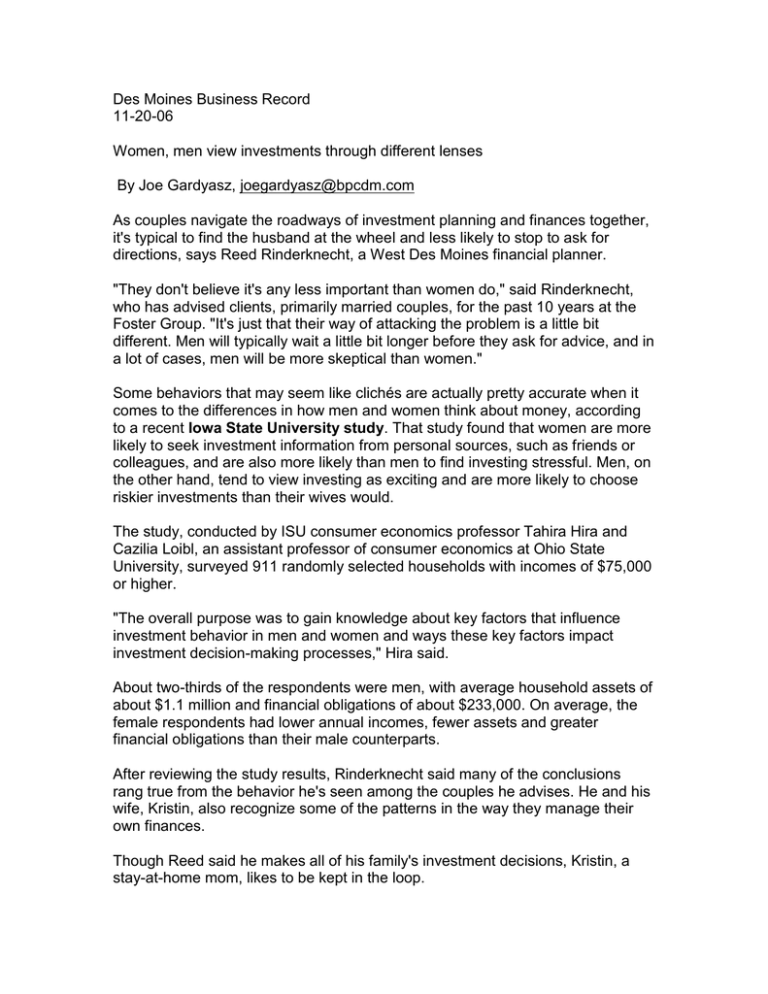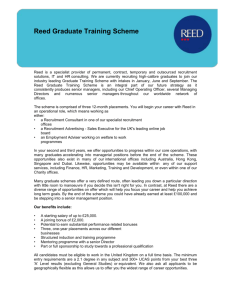Des Moines Business Record 11-20-06 Women, men view investments through different lenses
advertisement

Des Moines Business Record 11-20-06 Women, men view investments through different lenses By Joe Gardyasz, joegardyasz@bpcdm.com As couples navigate the roadways of investment planning and finances together, it's typical to find the husband at the wheel and less likely to stop to ask for directions, says Reed Rinderknecht, a West Des Moines financial planner. "They don't believe it's any less important than women do," said Rinderknecht, who has advised clients, primarily married couples, for the past 10 years at the Foster Group. "It's just that their way of attacking the problem is a little bit different. Men will typically wait a little bit longer before they ask for advice, and in a lot of cases, men will be more skeptical than women." Some behaviors that may seem like clichés are actually pretty accurate when it comes to the differences in how men and women think about money, according to a recent Iowa State University study. That study found that women are more likely to seek investment information from personal sources, such as friends or colleagues, and are also more likely than men to find investing stressful. Men, on the other hand, tend to view investing as exciting and are more likely to choose riskier investments than their wives would. The study, conducted by ISU consumer economics professor Tahira Hira and Cazilia Loibl, an assistant professor of consumer economics at Ohio State University, surveyed 911 randomly selected households with incomes of $75,000 or higher. "The overall purpose was to gain knowledge about key factors that influence investment behavior in men and women and ways these key factors impact investment decision-making processes," Hira said. About two-thirds of the respondents were men, with average household assets of about $1.1 million and financial obligations of about $233,000. On average, the female respondents had lower annual incomes, fewer assets and greater financial obligations than their male counterparts. After reviewing the study results, Rinderknecht said many of the conclusions rang true from the behavior he's seen among the couples he advises. He and his wife, Kristin, also recognize some of the patterns in the way they manage their own finances. Though Reed said he makes all of his family's investment decisions, Kristin, a stay-at-home mom, likes to be kept in the loop. "It's our money," said Kristin, who will celebrate her 15th anniversary with Reed in January. "I don't think either of us sees it as his or her money. I feel that as I get older, I very much need to be apprised of what we have so that if anything happens, I have a better handle on it even than what I do now." Though she serves as executive director of the Financial Planning Association of Iowa -- Reed is its current president -- her role in that position is organizational, not financial, she said. The couple, who met in California when Reed was in Pasadena to play in the 1991 Rose Bowl for the Hawkeyes, say they always consult each other on major purchases. "And if I've got an area where I want to donate money, I usually run it by Reed," Kristin said. "So we have a very open line of communication when it comes to finances. It is very different from people I know who don't tell their spouses everything." Having both spouses involved in the financial planning process, at least to some extent, is something Rinderknecht advises his clients to do. "It's not required, but we really encourage that both of them come for investment planning," he said. "Just in the past two years or so, we've probably had 20 surviving-spouse scenarios, either an existing client or a prospective client coming to seek our advice. It really helps with an existing client if both of them have been involved in the planning." The study indicated distinct differences in how men and women view financial advisers, with women more likely to seek a professional's advice, Hira said. "While women were more likely to describe financial advisers as sources of information and careful listeners, men were more likely to describe financial advisers as exerting too much pressure and charging too much for services," she said. "Women also expressed less confidence than men about their financial futures, knowledge of their retirement needs and their current financial situations. They were also more dependent on their spouses for their financial security." In about two out of every three couples, it's typically the husband who is dictating the investment decisions, Reed Rinderknecht said, in part because it's often the husband who is the Type-A personality. "Where it works the best is when they are both willing to listen to their spouse a little bit and are willing to come to a compromise," he said. "The study mentioned that men typically are willing to take on a little more risk than women, and I would say that's true. But where we see very content and happy couples and marriages when it comes to finances is when they're both willing to compromise a little bit. Maybe the man wants to be in 100 percent stocks, and the woman wants to be 50-50 stocks and bonds, so they might agree on a 70-30 or 80-20 split." From his experience working with couples, "women are definitely more concerned about money than men are in general," he said. "Not that men don't think it's important, but women actually tend to worry more, [asking]: Are we doing the right thing; who should we talk to for information, do we need to be reviewing what we're doing? Men, on the other hand, take a more laid-back approach to the whole idea of finances. I think part of it is that men tend to be a little bit overconfident about their abilities."


